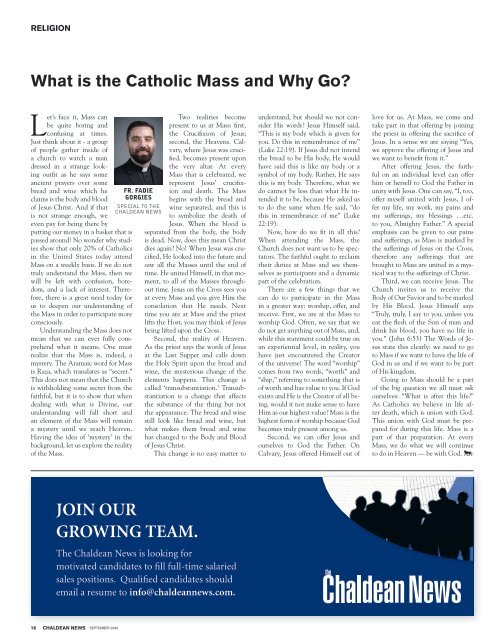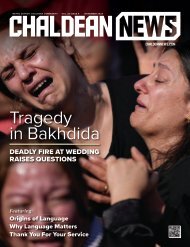SEPTEMBER 2020
You also want an ePaper? Increase the reach of your titles
YUMPU automatically turns print PDFs into web optimized ePapers that Google loves.
RELIGION<br />
What is the Catholic Mass and Why Go?<br />
Let’s face it, Mass can<br />
be quite boring and<br />
confusing at times.<br />
Just think about it - a group<br />
of people gather inside of<br />
a church to watch a man<br />
dressed in a strange looking<br />
outfit as he says some<br />
ancient prayers over some<br />
bread and wine which he<br />
claims is the body and blood<br />
of Jesus Christ. And if that<br />
is not strange enough, we<br />
even pay for being there by<br />
putting our money in a basket that is<br />
passed around! No wonder why studies<br />
show that only 20% of Catholics<br />
in the United States today attend<br />
Mass on a weekly basis. If we do not<br />
truly understand the Mass, then we<br />
will be left with confusion, boredom,<br />
and a lack of interest. Therefore,<br />
there is a great need today for<br />
us to deepen our understanding of<br />
the Mass in order to participate more<br />
consciously.<br />
Understanding the Mass does not<br />
mean that we can ever fully comprehend<br />
what it means. One must<br />
realize that the Mass is, indeed, a<br />
mystery. The Aramaic word for Mass<br />
is Raza, which translates as “secret.”<br />
This does not mean that the Church<br />
is withholding some secret from the<br />
faithful, but it is to show that when<br />
dealing with what is Divine, our<br />
understanding will fall short and<br />
an element of the Mass will remain<br />
a mystery until we reach Heaven.<br />
Having the idea of ‘mystery’ in the<br />
background, let us explore the reality<br />
of the Mass.<br />
FR. FADIE<br />
GORGIES<br />
SPECIAL TO THE<br />
CHALDEAN NEWS<br />
Two realities become<br />
present to us at Mass: first,<br />
the Crucifixion of Jesus;<br />
second, the Heavens. Calvary,<br />
where Jesus was crucified,<br />
becomes present upon<br />
the very altar. At every<br />
Mass that is celebrated, we<br />
represent Jesus’ crucifixion<br />
and death. The Mass<br />
begins with the bread and<br />
wine separated, and this is<br />
to symbolize the death of<br />
Jesus. When the blood is<br />
separated from the body, the body<br />
is dead. Now, does this mean Christ<br />
dies again? No! When Jesus was crucified,<br />
He looked into the future and<br />
saw all the Masses until the end of<br />
time. He united Himself, in that moment,<br />
to all of the Masses throughout<br />
time. Jesus on the Cross sees you<br />
at every Mass and you give Him the<br />
consolation that He needs. Next<br />
time you are at Mass and the priest<br />
lifts the Host, you may think of Jesus<br />
being lifted upon the Cross.<br />
Second, the reality of Heaven.<br />
As the priest says the words of Jesus<br />
at the Last Supper and calls down<br />
the Holy Spirit upon the bread and<br />
wine, the mysterious change of the<br />
elements happens. This change is<br />
called ‘transubstantiation.’ Transubstantiation<br />
is a change that affects<br />
the substance of the thing but not<br />
the appearance. The bread and wine<br />
still look like bread and wine, but<br />
what makes them bread and wine<br />
has changed to the Body and Blood<br />
of Jesus Christ.<br />
This change is no easy matter to<br />
understand, but should we not consider<br />
His words? Jesus Himself said,<br />
“This is my body which is given for<br />
you. Do this in remembrance of me”<br />
(Luke 22:19). If Jesus did not intend<br />
the bread to be His body, He would<br />
have said this is like my body or a<br />
symbol of my body. Rather, He says<br />
this is my body. Therefore, what we<br />
do cannot be less than what He intended<br />
it to be, because He asked us<br />
to do the same when He said, “do<br />
this in remembrance of me” (Luke<br />
22:19).<br />
Now, how do we fit in all this?<br />
When attending the Mass, the<br />
Church does not want us to be spectators.<br />
The faithful ought to reclaim<br />
their duties at Mass and see themselves<br />
as participants and a dynamic<br />
part of the celebration.<br />
There are a few things that we<br />
can do to participate in the Mass<br />
in a greater way: worship, offer, and<br />
receive. First, we are at the Mass to<br />
worship God. Often, we say that we<br />
do not get anything out of Mass, and,<br />
while this statement could be true on<br />
an experiential level, in reality, you<br />
have just encountered the Creator<br />
of the universe! The word “worship”<br />
comes from two words, “worth” and<br />
“ship,” referring to something that is<br />
of worth and has value to you. If God<br />
exists and He is the Creator of all being,<br />
would it not make sense to have<br />
Him as our highest value? Mass is the<br />
highest form of worship because God<br />
becomes truly present among us.<br />
Second, we can offer Jesus and<br />
ourselves to God the Father. On<br />
Calvary, Jesus offered Himself out of<br />
love for us. At Mass, we come and<br />
take part in that offering by joining<br />
the priest in offering the sacrifice of<br />
Jesus. In a sense we are saying “Yes,<br />
we approve the offering of Jesus and<br />
we want to benefit from it.”<br />
After offering Jesus, the faithful<br />
on an individual level can offer<br />
him or herself to God the Father in<br />
unity with Jesus. One can say, “I, too,<br />
offer myself united with Jesus, I offer<br />
my life, my work, my pains and<br />
my sufferings, my blessings …etc.<br />
to you, Almighty Father.” A special<br />
emphasis can be given to our pains<br />
and sufferings, as Mass is marked by<br />
the sufferings of Jesus on the Cross,<br />
therefore any sufferings that are<br />
brought to Mass are united in a mystical<br />
way to the sufferings of Christ.<br />
Third, we can receive Jesus. The<br />
Church invites us to receive the<br />
Body of Our Savior and to be marked<br />
by His Blood. Jesus Himself says<br />
“Truly, truly, I say to you, unless you<br />
eat the flesh of the Son of man and<br />
drink his blood, you have no life in<br />
you.” (John 6:53) The Words of Jesus<br />
state this clearly: we need to go<br />
to Mass if we want to have the life of<br />
God in us and if we want to be part<br />
of His kingdom.<br />
Going to Mass should be a part<br />
of the big question we all must ask<br />
ourselves: “What is after this life?”<br />
As Catholics we believe in life after<br />
death, which is union with God.<br />
This union with God must be prepared<br />
for during this life. Mass is a<br />
part of that preparation. At every<br />
Mass, we do what we will continue<br />
to do in Heaven — be with God.<br />
JOIN OUR<br />
GROWING TEAM.<br />
The Chaldean News is looking for<br />
motivated candidates to fill full-time salaried<br />
sales positions. Qualified candidates should<br />
email a resume to info@chaldeannews.com.<br />
16 CHALDEAN NEWS <strong>SEPTEMBER</strong> <strong>2020</strong>

















